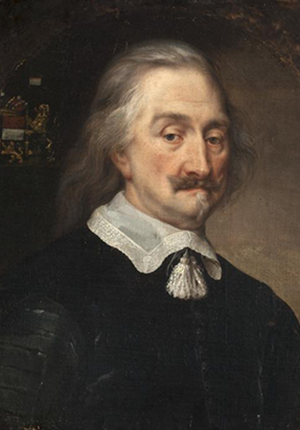Historic Document
Leviathan, or the Matter, Forme and Power of a Common Wealth Ecclesiastical and Civil (1651)
Thomas Hobbes | 1651

National Galleries of Scotland, Purchased 1887
Summary
Thomas Hobbes (1588-1679) was the translator of Thucydides’ History of the War between the Athenians and the Peloponnesians (1628) and of Homer’s Iliad and Odyssey (1675) and the author of The Elements of Law, Natural and Politic (1640), De cive (1641), Leviathan, or the Matter, Forme and Power of a Common Wealth Ecclesiastical and Civil (1651), and Behemoth: the History of the Causes of the Civil Wars of England and of the Counsels and Artifices by which they were carried on from the year 1640 to the year 1662, which was published posthumously. He was best known in America for the account of man’s natural state and the defense of absolute sovereignty found in his Leviathan. For many of the Founding generation, Hobbes’s notion that morality is artificial was an “absurd and impious doctrine.” (Alexander Hamilton in “The Farmer Refuted,” 1775).
Selected by

Paul Rahe
Professor of History and Charles O. Lee and Louise K. Lee Chair in the Western Heritage at Hillsdale College

Jeffrey Rosen
President and CEO, National Constitution Center

Colleen A. Sheehan
Professor of Politics at the Arizona State University School of Civic and Economic Thought and Leadership
Document Excerpt
CHAPTER XIII. OF THE NATURALL CONDITION OF MANKIND, AS CONCERNING THEIR FELICITY, AND MISERY
Nature hath made men so equall, in the faculties of body, and mind; as that though there bee found one man sometimes manifestly stronger in body, or of quicker mind then another; yet when all is reckoned together, the difference between man, and man, is not so considerable, as that one man can thereupon claim to himselfe any benefit, to which another may not pretend, as well as he. For as to the strength of body, the weakest has strength enough to kill the strongest, either by secret machination, or by confederacy with others, that are in the same danger with himselfe….
From Equality Proceeds Diffidence
From this equality of ability, ariseth equality of hope in the attaining of our Ends. And therefore if any two men desire the same thing, which neverthelesse they cannot both enjoy, they become enemies; and in the way to their End, (which is principally their owne conservation, and sometimes their delectation only,) endeavour to destroy, or subdue one an other…..
Out Of Civil States, There Is Alwayes Warre Of Every One Against Every One
Hereby it is manifest, that during the time men live without a common Power to keep them all in awe, they are in that condition which is called Warre; and such a warre, as is of every man, against every man…..
The Incommodities of such a War
Whatsoever therefore is consequent to a time of Warre, where every man is Enemy to every man; the same is consequent to the time, wherein men live without other security, than what their own strength, and their own invention shall furnish them withal. In such condition, there is no place for Industry; because the fruit thereof is uncertain; and consequently no Culture of the earth; no Navigation, nor use of the commodities that may be imported by Sea; no commodious Building; no Instruments of moving, and removing such things as require much force; no Knowledge of the face of the Earth; no account of Time; no Arts; no Letters; no Society; and which is worst of all, continuall feare, and danger of violent death; And the life of man, solitary, poore, nasty, brutish, and short.
In Such A Warre, Nothing Is Unjust
To this warre of every man against every man, this also is consequent; that nothing can be Unjust. The notions of Right and Wrong, Justice and Injustice have there no place. Where there is no common Power, there is no Law: where no Law, no Injustice. Force and fraud, are in warre the two Cardinall vertues….
The Passions that Incline Men to Peace
The Passions that encline men to Peace, are Feare of Death; Desire of such things as ar necessary to commodious living; and a Hope by their Industry to obtain them. And Reason suggesteth convenient Articles of Peace, upon which men may be drawn to agreement. These Articles, are they, which otherwise are called Lawes of Nature: whereof I shall speak more particularly in the two following Chapters.
CHAPTER XIV. OF THE FIRST AND SECOND NATURALL LAWES, AND OF CONTRACTS
Right Of Nature What
The RIGHT OF NATURE, which Writers commonly call Jus Naturale, is the Liberty each man hath, to use his own power, as he will himselfe, for the preservation of his own Nature; that is to say, of his own Life; and consequently, of doing any thing, which in his own Judgement, and Reason, hee shall conceive to be the aptest means thereunto.
Liberty What
By LIBERTY, is understood, according to the proper signification of the word, the absence of externall Impediments: which Impediments, may oft take away part of a mans power to do what hee would; but cannot hinder him from using the power left him, according as his judgement, and reason shall dictate to him.
A Law Of Nature What
A LAW OF NATURE, (Lex Naturalis,) is a Precept, or generall Rule, found out by Reason, by which a man is forbidden to do, that, which is destructive of his life, or taketh away the means of preserving the same; and to omit, that, by which he thinketh it may be best preserved. For though they that speak of this subject, use to confound Jus, and Lex, Right and Law; yet they ought to be distinguished; because RIGHT, consisteth in liberty to do, or to forbeare; Whereas LAW, determineth, and bindeth to one of them: so that Law, and Right, differ as much, as Obligation, and Liberty; which in one and the same matter are inconsistent.
Naturally Every Man Has Right To Everything
And because the condition of Man, (as hath been declared in the precedent Chapter) is a condition of Warre of every one against every one; in which case every one is governed by his own Reason; and there is nothing he can make use of, that may not be a help unto him, in preserving his life against his enemyes; It followeth, that in such a condition, every man has a Right to every thing; even to one anothers body. And therefore, as long as this naturall Right of every man to every thing endureth, there can be no security to any man, (how strong or wise soever he be,) of living out the time, which Nature ordinarily alloweth men to live.
The Fundamental Law Of Nature
And consequently it is a precept, or generall rule of Reason, “That every man, ought to endeavour Peace, as farre as he has hope of obtaining it; and when he cannot obtain it, that he may seek, and use, all helps, and advantages of Warre.” The first branch, of which Rule, containeth the first, and Fundamentall Law of Nature; which is, “To seek Peace, and follow it.” The Second, the summe of the Right of Nature; which is, “By all means we can, to defend our selves.”
The Second Law Of Nature
From this Fundamentall Law of Nature, by which men are commanded to endeavour Peace, is derived this second Law; “That a man be willing, when others are so too, as farre-forth, as for Peace, and defence of himselfe he shall think it necessary, to lay down this right to all things; and be contented with so much liberty against other men, as he would allow other men against himselfe.” ….
Contract What
The mutuall transferring of Right, is that which men call CONTRACT.
There is difference, between transferring of Right to the Thing; and transferring, or tradition, that is, delivery of the Thing it selfe. For the Thing may be delivered together with the Translation of the Right; as in buying and selling with ready mony; or exchange of goods, or lands: and it may be delivered some time after.
Covenant What
Again, one of the Contractors, may deliver the Thing contracted for on his part, and leave the other to perform his part at some determinate time after, and in the mean time be trusted; and then the Contract on his part, is called PACT, or COVENANT: Or both parts may contract now, to performe hereafter: in which cases, he that is to performe in time to come, being trusted, his performance is called Keeping Of Promise, or Faith; and the fayling of performance (if it be voluntary) Violation Of Faith….
CHAPTER XV. OF OTHER LAWES OF NATURE
The Third Law Of Nature, Justice
From that law of Nature, by which we are obliged to transferre to another, such Rights, as being retained, hinder the peace of Mankind, there followeth a Third; which is this, That Men Performe Their Covenants Made: without which, Covenants are in vain, and but Empty words; and the Right of all men to all things remaining, wee are still in the condition of Warre.
Justice And Injustice What
And in this law of Nature, consisteth the Fountain and Originall of JUSTICE. For where no Covenant hath preceded, there hath no Right been transferred, and every man has right to every thing; and consequently, no action can be Unjust. But when a Covenant is made, then to break it is Unjust: And the definition of INJUSTICE, is no other than The Not Performance Of Covenant. And whatsoever is not Unjust, is Just….




